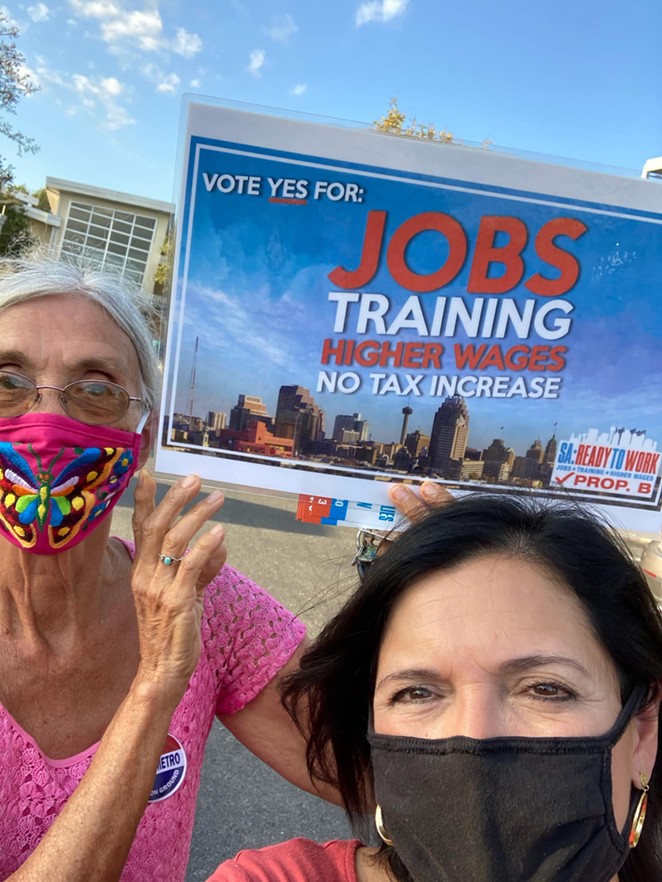
Facebook / COPS/Metro Alliance
Edna Molina and Cathy McCoy of COPS/Metro Alliance make the case for Proposition B.
Proposition B, dubbed SA Ready To Work, calls for redirecting $154 million in sales tax revenue from aquifer protection and into retraining 40,000 workers who lost their jobs amid the COVID-19 pandemic. Proponents argue the program, which includes stipends and daycare, would allow the Alamo City to remake what's long been a low-wage, tourism-driven economy.
"These were people who, before the pandemic, were working jobs that weren't very high paying and often didn't have benefits," said San Antonio Councilwoman Adrianna Rocha Garcia. "Very often, they were were working multiple jobs to make ends meet."
But opponents argue the plan — which would rely on the San Antonio Water System and Bexar County to fund protection of the aquifer and creekways — would put local drinking water at risk. What's more, voters are unlikely to pay much attention to down-ballot local proposals, political observers say.
"People are really going to have to be zeroed in and have the wherewithal to make it to the end of the ballot," said St. Mary's University Political Science Professor Arturo Vega. "A lot of them just aren't going to be focused on local issues this cycle."
While Rocha Garcia acknowledges the challenge of breaking through the clutter in a presidential year, she said proponents have leveraged their limited ad dollars through social media buys.
Prop B is also benefits from the people power of community organizing group COPS/Metro Alliance, which fought for the original job retraining program the ballot proposal aims to expand. What's more, the measure gained buy-in from major employers such as USAA, Toyota and H-E-B.
During a weekend appearance on public TV station KLRN's On the Record program, Mayor Ron Nirenberg said San Antonians have filed 150,000 unemployment claims since the pandemic began. The Bureau of Labor Statistics estimates that as many as in one in three of those jobs is unlikely to return within the next five years.
"What we've got to do is match our workforce, which currently has high unemployment and underemployment, with jobs that are actually available and sitting open," Nirenberg said.
Even so, St. Mary's Vega said many residents are likely to balk at the idea of spending city money amid the uncertainty of the pandemic. Even though Prop B proponents point out that it's funded by using an existing sales tax, some voters will simply be turned off by any new city-funded proposal.
"A tax is a tax is a tax, whether it's a renewal or not," Vega said.
Despite the obstacles, Rocha Garcia said San Antonians understand what's at stake and will be eager to push for an economic recovery, especially since the language on the ballot is clear about what the plan does. Local voters, she added, also understand that aquifer protection won't be going away.
"When it comes to protecting the aquifer, this isn't an either-or-proposition," Rocha Garcia said.
Stay on top of San Antonio news and views. Sign up for our Weekly Headlines Newsletter.

